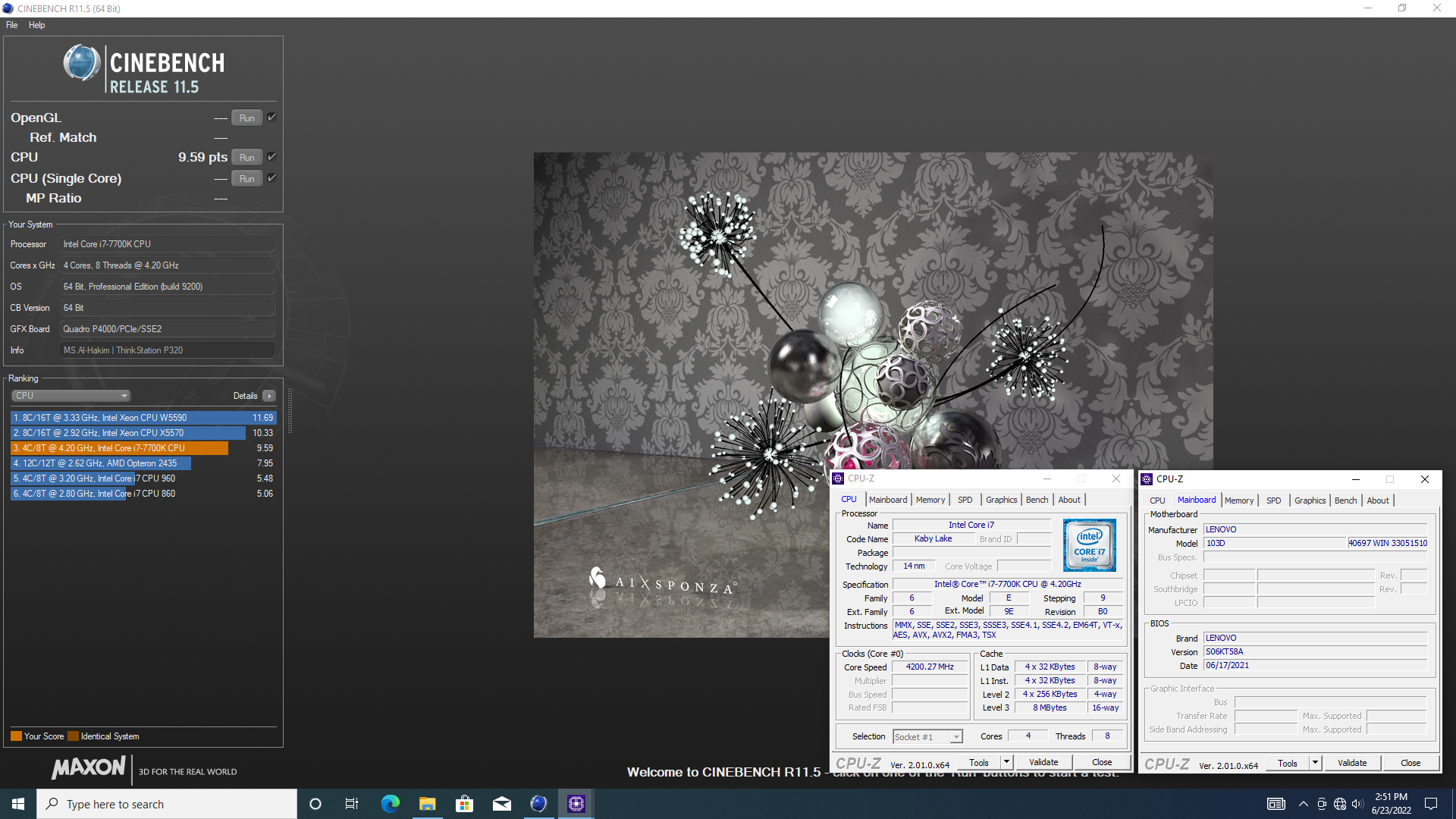Cinebench - R11.5 score 9.59 pts with a i7-7700K
Thursday, 01 January 1970 07:00 | Update at null
Media Gallery
Screenshot

Device, Setup, etc

URL
https://hwbot.org/submission/5024395https://www.facebook.com/hakimnu.id/posts/3318509521715021
Information Detail
Hardware: Intel Core i7 7700K
Specs:CPUID : Intel(R) Core(TM) i7-7700K CPU @ 4.2GHz
Architecture : x86
Codename : Kaby Lake
L3 Cache : 8MB
Clock : 4.2GHz - 4.5GHz
Core/Thread : 4/8
TDP : 91W
Technology : 14nm
Socket : LGA1151
IGPU : Intel HD Graphics 630
See more specification...
Software: Cinebench - R11.5
Score: 9.59 pts
About: Cinebench - R11.5Cinebench R11.5 is one of MAXON's popular benchmarks designed to measure CPU performance in complex 3D rendering scenarios. The benchmark is based on the CINEMA 4D rendering engine and is widely used by tech enthusiasts, hardware reviewers, and professionals in the creative industry. Cinebench R11.5 simulates the rendering process of AixSponza's “No Keyframes” animation scene, which consists of thousands of 3D objects and various advanced lighting techniques and visual effects.
One of the key strengths of Cinebench R11.5 is its ability to use up to 64 processor threads in parallel, making it perfect for measuring the overall performance of multi-core CPUs. The test makes use of advanced algorithms such as sharp and blurry reflections, area lighting, realistic shadows, procedural shaders, and anti-aliasing, which represent real workloads in the 3D animation and visualization industry.
The scenes rendered in this benchmark include around 2,000 objects and over 300,000 polygons, making it very demanding for the test system. Test results are given in points (pts), where higher numbers indicate faster and more efficient CPU performance in completing rendering tasks. As such, Cinebench R11.5 is a very useful reference for assessing processor performance in creative and technical applications.
Despite the arrival of newer versions such as R15 and R23, Cinebench R11.5 is still relevant for users who want to make comparisons across processor generations. Many overclockers and users of legacy systems still rely on this version for stability and performance benchmarks due to its realistic yet not too heavy workloads for modern CPUs. With its ability to simulate real-world workflows, Cinebench R11.5 is a great test tool for anyone looking to evaluate their CPU performance in the context of professional rendering.
The Intel Core i7-7700K, launched in early 2017, is a high-performance desktop processor from the 7th generation Kaby Lake family. Built on the 14nm process, the i7-7700K features 4 physical cores and 8 threads, thanks to Hyper-Threading Technology, and is targeted at enthusiasts, gamers, and power users. It operates at a base frequency of 4.2 GHz and can boost up to 4.5 GHz via Intel Turbo Boost, delivering excellent single-threaded performance one of the highest at the time of its release.
As part of Intel’s “K” series, the Core i7-7700K has an unlocked multiplier, making it ideal for overclocking on compatible Z-series motherboards. However, with a TDP of 91W, the processor demands an effective cooling solution, especially when overclocked beyond its stock speeds. Users typically pair this CPU with aftermarket air or liquid coolers to ensure thermal stability under heavy workloads or gaming sessions.
The processor includes Intel HD Graphics 630, which supports 4K output at 60Hz and is sufficient for basic tasks like web browsing, video playback, and office work. However, for serious gaming or GPU-accelerated workloads, a discrete graphics card is still necessary, especially when paired with a high-refresh-rate monitor or demanding software.
In terms of real-world performance, the i7-7700K remains capable even today for 1080p and 1440p gaming, general productivity, and creative tasks. It delivers solid frame rates in many modern titles when used with a modern GPU, and it handles applications like Adobe Photoshop, Premiere Pro, and coding environments reasonably well. However, due to its limited core count by today’s standards and lack of PCIe 4.0 support, it has started to show its age in multi-threaded and next-gen workloads.
Despite being surpassed by newer Intel and AMD CPUs with more cores and better efficiency, the i7-7700K still holds value in many mid-range desktop setups, especially for users who already own an LGA 1151 system and want to maximize performance without a full platform upgrade.
* Not Avaiable
